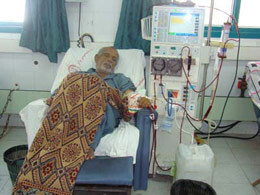9 July 2010
Ahmed Zourob is one of the 164 patients who fill the dialysis unit at al-Shifa Hospital in Gaza City everyday. Like the others, he is here because his kidneys, deteriorated by disease, cannot adequately perform their function; as with many of the patients here, he relies on the medical treatment he receives at al-Shifa to survive. Yet, now under siege for more than three years and thus unable to provide necessary medication, plagued with equipment in perpetual disrepair, and confronted with an acute shortage of electricity, al-Shifa’s dialysis unit is experiencing its own state of deterioration.
“We have witnessed almost a fifty percent shortage in the medicine and machines we need to run this unit at its capacity due to the Israeli occupation and closure, not to mention the problems arising from the electricity crisis,” says Dr. Mohammad Shatat, Deputy Director of al-Shifa’s dialysis unit, the largest such unit in the Gaza Strip. The consequences, he says, have been a visible decline in the health and prospects for recovery and survival of the patients.
Dialysis treatment is not easy under any circumstances. Patients suffering from chronic kidney failure must spend up to four hours each treatment attached to a dialysis machine which circulates the blood from their body through a filtration system to remove toxins and before returning it to their bodies. In normal conditions, patients receive dialysis treatment three times a week and are also required to take up to five different types of medicine, including antibiotics and a combination of hormones and supplements which protect the kidneys from further damage and prevent the onset of anemia, Dr. Shatat explains.

Ahmed Zourob receiving dialysis treatment at al-Shifa Hospital in Gaza City. (PCHR)
Ahmed was diagnosed with kidney failure in 2008, and he has been unemployed for about as long. The closure has worsened Ahmed’s condition by simultaneously denying him access to the medication he needs through al-Shifa and denying him of an economic livelihood that would allow him to purchase his medication outside the hospital: “Three months ago the hospital told me that my medicine was no longer available in the hospital pharmacy, but without a job I cannot afford the medication on my own. I don’t know what I can do.” Without access to the prescribed medication, Ahmed’s condition has steadily deteriorated in the past year and he has recently been diagnosed with anemia.
Under its policy of closure, Israel has also disallowed the import of medical equipment, including new dialysis machines and spare parts needed to repair those machines which are no longer functioning. As a result of inadequate resources, dialysis treatment has had to be reduced for all patients from three to two times a week, which presents grave implications for the health of the patients, says Dr. Shatat: “Dialysis treatment serves the purpose of the kidneys, so it is vital for these patients; if they fail to receive the required treatment the consequences can be deadly.” Indeed, four patients from the dialysis unit died in April 2009 immediately following the reduction in treatment.
The entire healthcare sector in the Gaza Strip suffers from an acute shortage in medicine and medical equipment due to the Israeli-imposed closure. According to the Palestinian Ministry of Health, 110 types of medicine and 123 types of medical equipment have run out in the Gaza Strip during the first six months of 2010; another 76 types of medicine are expected to run out in the coming three months.
The dire situation in al-Shifa’s dialysis unit caused by the restriction of goods into Gaza is exacerbated by constant electricity cuts, a result of the energy crisis effecting the Gaza Strip. For the 1.5 million Palestinians inside Gaza, constant electricity outages have become just another burden of daily life. In al-Shifa’s dialysis unit, however, the sudden and frequent outages which come in addition to the regular electricity cuts place the patients’ lives and the medical machines at great risk. “When the electricity goes out during a dialysis cycle,” Dr. Shatat explains, “approximately 300cc of blood is caught outside the body of the patient and cannot be returned. We have lost several dialysis machines due to sudden changes in electricity levels, but the risk posed to patients’ lives is much greater.”
Israel permits the entry of only enough fuel to run the Gaza power plant at 45 percent of the capacity needed to adequately supply the demand in Gaza. The entire Gaza Strip now experiences power outages of up to twelve hours a day, disrupting all aspects of the lives of Palestinians who are already living with hardships caused by the Israeli closure.
Accordingly, al-Shifa depends on four generators for its electricity, and they are old and in constant need of repair. “The generators are meant as backups, not to be run all the time,” says Dr. Shatat. “Now the generators are used to power all the hospital wards and so they need repairing. But the Israeli closure makes it very difficult to obtain the parts we need; we’ve been waiting for a year for batteries, prohibited under ‘security concerns.’”
Under these difficult conditions, increasing numbers of patients in Gaza suffering from serious injuries and diseases are forced to seek treatment outside of the Gaza Strip. Yet the process for obtaining the necessary permits for transfer from Gaza to hospitals abroad is long and arduous. Hundreds of patients — including women and children — are denied each month by Israel under the guise of “security concerns.” Since 2007, the Palestinian Centre for Human Rights has documented the cases of 67 patients who have died because they could not obtain the necessary treatment in Gaza and were denied a permit to seek medical treatment abroad.
This report is part of the Palestinian Centre for Human Rights’ Narratives Under Siege series.